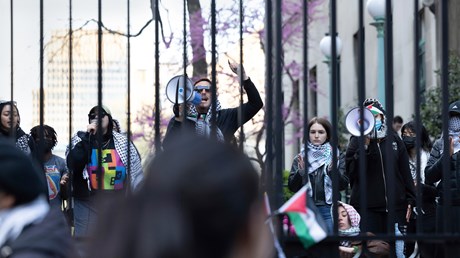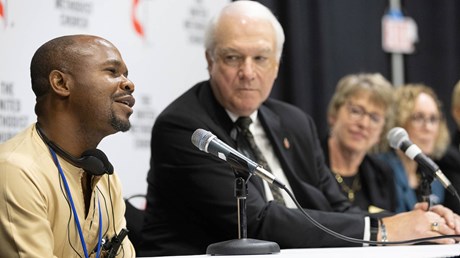|
The surprising argument that Saul of Tarsus was born into bondage.  Of the many letters the apostle Paul wrote, few survived. We have a good deal of his communication to churches as a whole—letters to groups of believers in particular cities. This makes sense. Such letters were read publicly and often; they were copied and disseminated and celebrated as Scripture soon after the ink had dried. Paul sent a number of letters to individuals as well. To read his biblical writings is to sense that you are glimpsing only a fraction of his relational network and influence. Almost all of those letters have been lost. But there are exceptions. It was a tall order for personal letters to ascend to the level of canon. It helped to be bound up with a great figure, a leader of a great community. Timothy, for instance, was a towering second-generation church leader; he was also the bishop of Ephesus, a major city of the Roman Empire and a major Christian center. Titus was a pillar of the Gentile mission and served as the bishop of Crete. Their eponymous letters had huge communities to champion their inclusion in Scripture. A mystery for the ages, then, is why Paul’s letter to Philemon—the leader of a house church in the minor city of Colossae—survives at all. It’s the most personal letter we have from Paul. It runs only 25 verses. The letter reveals a story. In it, a man named Onesimus has fled his master Philemon. Onesimus was most likely a household slave, a bondservant high in the pecking order. To call him a runaway slave is true, though it is misleading for modern readers, who might imagine Onesimus attempting to escape through something like the Underground Railroad. In fact, some scholars argue that Onesimus sought out Paul but planned to return to his master. Steven M. Baugh, ... A professor explains why examining a school’s doctrinal statement isn’t enough.  When I speak at churches around the country, the conversation after my talks often turns to the state of Christian higher education. I’m a professor at a Christian institution, and Christian parents and grandparents want to know where high school graduates can go to have their faith deepened rather than undermined. These concerns have only become more pressing given the ongoing rise in young people wandering away from the church and describing their religious convictions as “nothing in particular.” The question many Christians have for me is which colleges are “safe” or “real” Christian schools, which usually means those that have a truly conservative theological ethos. For those who aren’t familiar with the world of Christian higher ed, it can be difficult to identify these schools from outside the campus community, and parents often (reasonably) conclude an institution’s stance on human sexuality is the simplest indicator of a college’s commitment to Christian orthodoxy. LGBTQ questions are indeed important, and they can serve as a proxy for an institution’s broader theology. But by itself, this isn’t a reliable formula for finding a good Christian college. A school may stake out a bold position on sexuality and yet capitulate to what I’d suggest is the most overlooked and therefore most insidious threat to Christian education in America right now. It’s not progressive theology. It’s a pervasive consumerist anthropology. Theological anthropology concerns our assumptions about the nature and purpose of humanity. And by “consumerist anthropology” I mean the belief—often subconsciously held—that ... Every sin requires Christ’s atonement. But the Bible shows God punishing—and repairing—different sins differently.  Christian theology consistently holds together truths that seem to want to fall apart: Jesus is fully God and fully human. People are sinners and created in the image of God. The church is local and universal. And yet, despite what we affirm, in practice, Christians are often unable to walk and chew gum at the same time. Instead of holding two truths in tension, we tend to slide to one side or the other, distorting it in the process. We treat Jesus either as an invulnerable, transcendent being or as a mere prophet. We speak as if humans are either so degraded we are capable of nothing but sin or mostly fine with a few rough edges. We think of the church as if it were only our own sect or we minimize the local congregation. Evangelical theologians have done great work in Christology, anthropology, and ecclesiology, respectively, to retrieve those three truthful tensions. But there is a fourth tension yet to be retrieved: All sins ruin us, and yet not all sins ruin us equally. To start, let us be clear: Sin—however small—is a serious thing. And sin is only atoned for by the work of God in Jesus Christ. But saying that Christ is the only one who atones for all sin is different from saying that all sins do the same kind of work on us. All sins break the sinner and create havoc around us. And yet the Scriptures consistently depict the sins we do as different, not only in effect on one another but before God. Within the Law, for example, different social remedies are given for different sins, and so are different sacrifices (Lev. 4; Ex. 21). Not everything requires a bull or a goat. Sometimes a dove will do. In the Prophets and Proverbs, God distinguishes—and even prioritizes—certain ... As the presidential election approaches, the incumbent government seeks to win support with aid to churches and pastors.  In many countries, politicians try to win over religious voters by highlighting areas of shared interest between their agenda and the faithful’s priorities. In Venezuela, candidates are offering pastors cash. With less than three months until Venezuela’s presidential elections, incumbent Nicolás Maduro is expanding two initiatives specifically aimed at the evangelical community, which represents 30.9 percent of the country’s population. Bono El Buen Pastor (“The Good Shepherd Bonus”), created last year, and Plan Mi Iglesia Bien Equipada (“My Well-Equipped Church Plan”) offer resources to pastors and their churches, including cash, chairs, construction materials, and expensive sound equipment—no strings attached. Mi Iglesia Bien Equipada exists under Misión Venezuela Bella, a government program that invests in recreation and arts spaces, which has remodeled nearly 3,000 churches since 2019. At the beginning of March, Maduro gathered 17,000 people in a pastors-only event in the northern city of Carabobo and announced that 20,000 additional pastors had become beneficiaries of the Bono El Buen Pastor program, which would deliver a monthly stipend of 495 bolivars (around $14 USD) to each new member. (Venezuela’s minimum legal monthly wage is 130 bolivars or $3.50.) Officially, the government says the program aims to give churchgoers dignified spaces where they can develop their faith. There are, however, those who view the state’s generosity with some suspicion. César Mermejo, president of the Evangelical Council of Venezuela and a leader of the Federación de Iglesias Mizpa de Venezuela, called these efforts by Maduro an attempt to buy the souls ... But true liberty, in art and in life, is created by constraints.  Taylor Swift answers to no one. Not music industry executives: Her songs returned to TikTok in the middle of a licensing dispute between the app and her label. Not mayors: When she graced their cities during her Eras tour, they declared days in her honor. Not the international community: A Singapore-exclusive stop in Southeast Asia sparked a row between the city-state and nearby Thailand and the Philippines. The Japanese embassy issued a statement about her Super Bowl travel plans. And Swift doesn’t plan on stopping anytime soon. She announced new music within minutes of winning her latest Grammy for album of the year. You might take all this as proof of Swift’s business genius, nothing personal. But in her latest album, The Tortured Poets Department, there’s definitely an “above it all” attitude. These songs are snarly. America’s sweetheart may have nothing left to prove. But she certainly has scores left to settle. Swift is hardly a stranger to revenge. This is the songwriter, after all, who brought us lyrics like “It’s obvious that wanting me dead / Has really brought you two together.” But TTPD broadens her aggression and scorns the prospect of reconciliation. A small-town girl takes on her community over a controversial love affair and trolls her parents with a joke pregnancy announcement. A depressed performer boasts sardonically about how well she can sell happiness to frenzied fans. A woman seethes at being seen as a problematic starlet by her new boyfriend’s circle. There’s a track suspiciously similar to an Olivia Rodrigo song (the two singers have a rumored feud). The title of another appears to name-drop Kim Kardashian, an older nemesis. Critics agree that ... A late historian explores how crusade hymns told both the classic story of gospel salvation and the evolving story of evangelical worship music.  Crowds of over 50,000. Famous special guests. Hundreds of cities in the US and around the world. Beloved, catchy songs. For many, these might sound like readouts from the Taylor Swift Eras Tour hype machine. But exchange the glittery girl power for the gospel in baritone, and you have one of the most successful musical touring acts in the postwar world: the Billy Graham Crusades. The first association that “Billy Graham Crusade” may evoke is not musical at all, but rather a close-up shot of the evangelist, with his penetrating, wide-eyed gaze and raised forearms, thundering, “The Bible says …” Admittedly, music was not the main focus. Yet as the late historian Edith Blumhofer shows in her final book, Songs I Love to Sing: The Billy Graham Crusades and the Shaping of Modern Worship, neither Graham’s ministry nor the late-century rise of contemporary Christian music can be understood without it. As crusade song leader Cliff Barrows pursued his main goal—“sing to save”—he and his teammates bridged stylistic, cultural, and generational divides, transforming evangelicals’ music into the harmonic blend of old and new that is familiar today. Mining rich resourcesBefore unpacking this highly original book, a few words about the author. Blumhofer is an American religious historian renowned for her empathetic biographies of hymnist Fanny J. Crosby and evangelist Aimee Semple McPherson, as well as broader studies of evangelicalism and Pentecostalism. She concluded her career with this new study, sadly succumbing to a battle with cancer in the process. To finish the project, she tapped Jesus People expert Larry Eskridge, with whom she had for many years directed the Institute ... Do activists often invest their work with religious significance? All the more reason for Christians to be discerning co-laborers.  I love nature documentaries, especially those narrated by David Attenborough. Whether watching with my children or on my own, I love seeing the majesty of the snowy Alps or kelp forests. But I’ve noticed that in recent years, nearly every somber vignette of a species struggling on the edge of survival ends with a call to action. Viewers are beckoned to take responsibility for causing a poor animal’s plight and to consider how they can fix things before the species is gone forever. I understand the impulse to believe that animals’ struggles should move humans to action. However, it is the ethics informing the narrator’s pleas that seem a bit muddled. By many documentarians’ admission, the species we marvel at on screen have emerged out of eons of struggles to survive and adapt to their surroundings. Sometimes, the narrators even remind us that this process has resulted in countless prior species disappearing into extinction. Whether you believe in a young or an old earth, in God’s hand or in meaningless physical forces guiding history, we can all agree that change, death, and selection favoring adaptability are features of life on earth. Witnessing it in real time makes for compelling television drama, but the moral indictment that you and I contribute to grave evil when one of these species goes extinct does not seem to square with the documentarians’ worldview. What compels us to see polar bears possibly going extinct in terms of moral right and wrong? If we take human action out of the equation, isn’t history littered with the bones of countless species that have gone extinct? Are not humans and their actions part of nature? A robust theology of creation careIf we listen closely, ... The government plans to close its porous border with Myanmar to boost security, separating ethnic groups that straddle the boundary.  Ngamreichan Tuithung runs a Christian boarding school that sits right at the border of India’s Manipur state and Myanmar. Amazing Grace Mission School is based in Wanglee Market, a small Indian town, and serves around 150 students from Myanmar and 6 from India. Since Myanmar’s 2021 coup, the school has become a safe haven for parents wanting to send their children away from the violence of the war raging on in Myanmar. To Tuithung, it’s an opportunity to share with students and parents “about God’s love and how God is taking care of us.” For decades, some parents in Myanmar (also known as Burma) have been able to easily send their kids to school in India, thanks to a government policy that allows citizens of either country living within 10 miles of the border to freely enter the other country without a visa. Many tribal communities share ethnic ties, familial bonds, and a way of life transcending territorial boundaries. Tuithung, who is from the Naga ethnic group, grew up in India but has many relatives in Myanmar. Because of their close ties, he can speak Burmese and visits them often. However, all this will change as the Indian government proceeds with its decision to close the international border between India and Myanmar, which shares boundaries with four Indian states: Arunachal Pradesh, Nagaland, Manipur, and Mizoram. India’s home minister Amit Shah says the action is needed to “ensure the internal security” and “to maintain the demographic structure” of northeastern India as the war in Myanmar continues. Plans include constructing a fence and implementing a surveillance system. Tuithung believes that even with tightened borders, the government will provide ... The rage of the mob is a poor substitute for real community.  This piece was adapted from Russell Moore’s newsletter. Subscribe here. As Columbia University and other elite campuses erupt into protests against the United States’ diplomatic and military support of Israel’s war against Hamas, US Sen. John Fetterman denounced the antisemitic speech of some of these protesters, remarking on the social platform X, “Add some tiki torches and it’s Charlottesville for these Jewish students.” Whatever one thinks of Fetterman’s analogy or of the Israel-Hamas war, we would do well to listen to the common ring of the Charlottesville chant, “You will not replace us! Jews will not replace us!” with the one recorded this week on the Columbia campus: “We have Zionists who have entered the camp!” An observer might have asked in Charlottesville, “What Jews are trying to replace you?” The white nationalists there would no doubt have told such a person that a shadowy cabal was seeking to import immigrants, to commit “white genocide.” Just so, another observer might ask at Columbia, “What Zionists have entered your camp?” Israeli military forces? No. The “Zionists” in question are Jewish students—one wearing a Star of David—attempting to walk on campus. At one level, the video of the students chanting seems almost farcical, like a parody out of an old episode of Portlandia. The leader yells out a sentence; the followers repeat it back—even to the point of repeating back, in unison, “Repeat after me.” Does that part really have to be repeated? Well, kind of; that’s part of what happens in a chant. The message is not reasoned discourse. The rote nature of the repetition ... The plan would organize UMC churches in four global regions, with each given more leeway around same-sex marriage and other theological issues.  The top legislative body of the United Methodist Church passed a series of measures Thursday to restructure the worldwide denomination to give each region greater equity in tailoring church life to its own customs and traditions. The primary measure, voted on as the UMC General Conference met at the Charlotte Convention Center in North Carolina, was an amendment to the church’s constitution to divide the denomination into four equal regions—Africa, Europe, the Philippines, and the United States. According to the plan, each region would be able to customize part of the denomination’s rulebook, the Book of Discipline, to fit local needs. While church regions in Africa, the Philippines, and Europe have already enjoyed some leeway in customizing church life, the United States has not. The vote on the constitutional amendment passed 586–164, or by 78 percent, which means it surpassed the two-thirds majority needed for constitutional amendments. It must now go before each smaller church region, called an annual conference, for ratification by the end of 2025. If ratified by two-thirds of delegates to the annual conferences, the restructuring would allow the four regions to set their own qualifications for ordaining clergy and lay leaders; publish their own hymnal and rituals, including rites for marriage; and establish its own judicial courts. A new Book of Discipline would have one section that could be revised and tailored for each of the four regional conferences. The two-week worldwide meeting is the first meeting of the General Conference in five years, due mostly to delays associated with the COVID-19 pandemic. It follows a painful schism that has split some 7,600 US-based churches from the denomination—a ... |
Site Mailing List
A Family Church for the "Whole" Family Christ View Church Copyright 2004 © Christ View Church. All Rights Reserved. Powered by Sitebuilder
|






